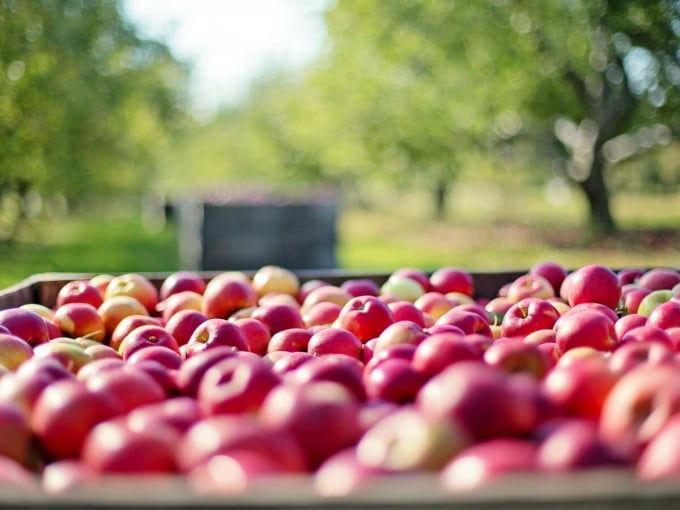June 8, 2025 | 01:55 GMT +7
June 8, 2025 | 01:55 GMT +7
Hotline: 0913.378.918
June 8, 2025 | 01:55 GMT +7
Hotline: 0913.378.918

Picked apples on orchard. Photo: Jill Wellington from Pixabay
In a study published in Green Chemistry , the researchers trialed the use of greener solvents to collect compounds found in apple pomace known for their powerful antioxidant, antibacterial, anti-diabetes and anti-inflammatory properties.
Co-author of the study, researcher Dr. Long Yu from the University of Adelaide's School of Agriculture, Food and Wine said: "Apple-processing industries generate tons of waste and by-products every year.
"Currently only around 20 percent of apple waste is retrieved and used as animal feed. The rest is incinerated, or sent to landfill or composting, which releases significant amounts of greenhouse gases."
Apple pomace (consisting of peels, pulp and seeds) is known to be rich in molecules known as 'flavonoids," which help regulate cellular activity and fight off free radicals.
"Extracting the 'goodness' from apple pomace is one way to make better use of this waste product and could help the apple processing industry become more sustainable," Dr. Yu said.
However, because the health-promoting extracts found in apples have low solubility in water-based solutions, up until now they have been difficult to collect without using toxic organic solvents, which generate large amounts of pollutants.
To address this problem, in their study the researchers investigated extraction using a new generation of green solvents known as Deep Eutectic Solvents (DES). These solvents consist of natural molecules, and provide a greener alternative to volatile and toxic organic solvents due to their superior extractability, negligible volatility and non-flammability. The solvents are also inexpensive.
The researchers developed an optimized approach using the green solvent to simultaneously collect and modify the health-promoting molecules pulled from apple pomace.
Compared with traditional solvents, the amount of bioactive compound pulled from apple pomace using the DES solvent was significantly higher than that collected using traditional solvents. Professor Vincent Bulone from the University of Adelaide's School of Agriculture, Food and Wine who supervised the research and co-wrote the paper, says they also found the antioxidant activity in the extracts was significantly higher than in samples obtained by conventional solvent extractions.
"We can conclude that DES is a green and tuneable alternative that not only efficiently collects powerful healthy molecules found in apple pomace, but also boosts the antioxidant activity of the extract. Not only do DES provide a more environmentally friendly way to make better use of what would otherwise go to waste, but the collection method may provide a way to improve skincare, biopharmaceuticals and nutraceuticals," said Professor Bulone.
The researchers say the same principle and approach could also be used to collect and modify other health-promoting molecules from other agricultural and food waste.
(Phys.org)

(VAN) With the war ongoing, many Ukrainian farmers and rural farming families face limited access to their land due to mines and lack the financial resources to purchase needed agricultural inputs.

(VAN) Vikas Rambal has quietly built a $5 billion business empire in manufacturing, property and solar, and catapulted onto the Rich List.

(VAN) Available cropland now at less than five percent, according to latest geospatial assessment from FAO and UNOSAT.

(VAN) Alt Carbon has raised $12 million in a seed round as it plans to scale its carbon dioxide removal work in the South Asian nation.

(VAN) Attempts to bring down the price of the Japanese staple have had little effect amid a cost-of-living crisis.

(VAN) Fourth most important food crop in peril as Latin America and Caribbean suffer from slow-onset climate disaster.

(VAN) Shifting market dynamics and the noise around new legislation has propelled Trouw Nutrition’s research around early life nutrition in poultry. Today, it continues to be a key area of research.